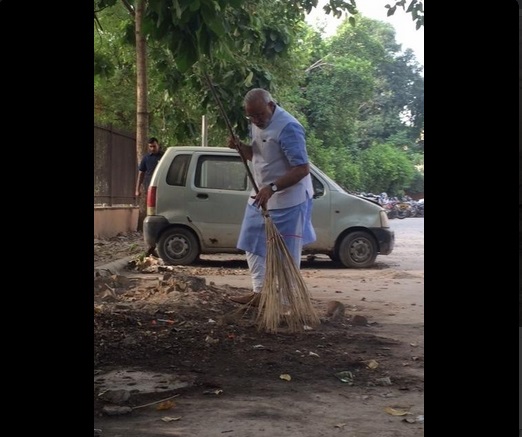
Prime Minister Narendra Modi uploaded his photo for the Clean India campaignTwitter
The 'Make in India' campaign, which invites the world to come and manufacture in India, was the prime minister's clarion call when he assumed office.
It continues to echo wherever he goes. This week it was sold among the NRIs and Americans who Modi was trying to woo back to the country.
The campaign is aimed at revving the growth engine and notching up magic two-digit growth in GDP, which the economists and pundits say will place the country on the road to progress.
But today, on the occasion of Mahatma Gandhi's birth anniversary, perhaps it would be meaningful for one Gujarati (the present PM) to pay heed to another's, written almost a century ago.
This is with reference to Gandhi's booklet Hind Swaraj, translated as 'Home-Rule' or better still as 'Self-Rule', that was written in 1908, on board a ship during his voyage from London.
While Gandhi called the book a gospel of love that seeks to replace violence with self-sacrifice and pits soul-force against brute force, it has been more famously known for its severe condemnation of modern civilisation that equates development and quality of life with materialism.
Gandhi is critical of how civilisation, as understood by most, lies in the fact that 'people living in it make bodily welfare the object of life'. Formerly, in Europe, people ploughed their lands mainly by manual labour. Now, one man can plough a vast tract by means of steam engines and can thus amass great wealth. This is called a sign of civilisation, he notes.
The more we indulge our passions the more unbridled they become, said Gandhi in the book.
"Our ancestors, therefore, set a limit to our indulgences. They saw that happiness was largely a mental condition. A man is not necessarily happy because he is rich, or unhappy because he is poor... Observing all this, our ancestors dissuaded us from luxuries and pleasures."
He goes on to note how machinery has begun to desolate Europe. "Ruination is now knocking at the English gates. Machinery is the chief symbol of modern civilization; it represents a great sin."
Touching on imported matches, pins and glassware, he asks the reader what did India do before these articles were introduced, and says people should go back to the old ways.
Make wicks as of old, with home-grown cotton and use handmade earthen saucers for lamps and save eyes and money, he said.
Was he advocating a return to pre-historic times? To struggle and labour?
To critics who tried to pin down his tirade against machinery, even as he singled out the Singer sewing machine for praise, Gandhi clarified that he did not object to machinery per se but to the craze for machinery.
"The craze is for what they call labour saving machinery. Men go on saving labour till thousands are without work and thrown on the open streets to die of starvation. I want to save time and labour not for a fraction of mankind but for all. I want the concentration of wealth, not in the hands of a few, but in the hands of all."
Today, with many nations opting for a GNH (Gross National Happiness) in place of the GDP, having seen that happiness and true quality of life do not come in glossy packages, perhaps it is time for Modi to think what exactly he is setting out to 'Make'.
With a population that shows no signs of stabilising, and the need to feed the 1.2 billion, perhaps it would not be a misplaced idea to give more importance to agriculture and the villages that Gandhi said should be self-reliant centres, rather than go for a manufacturing spree.


